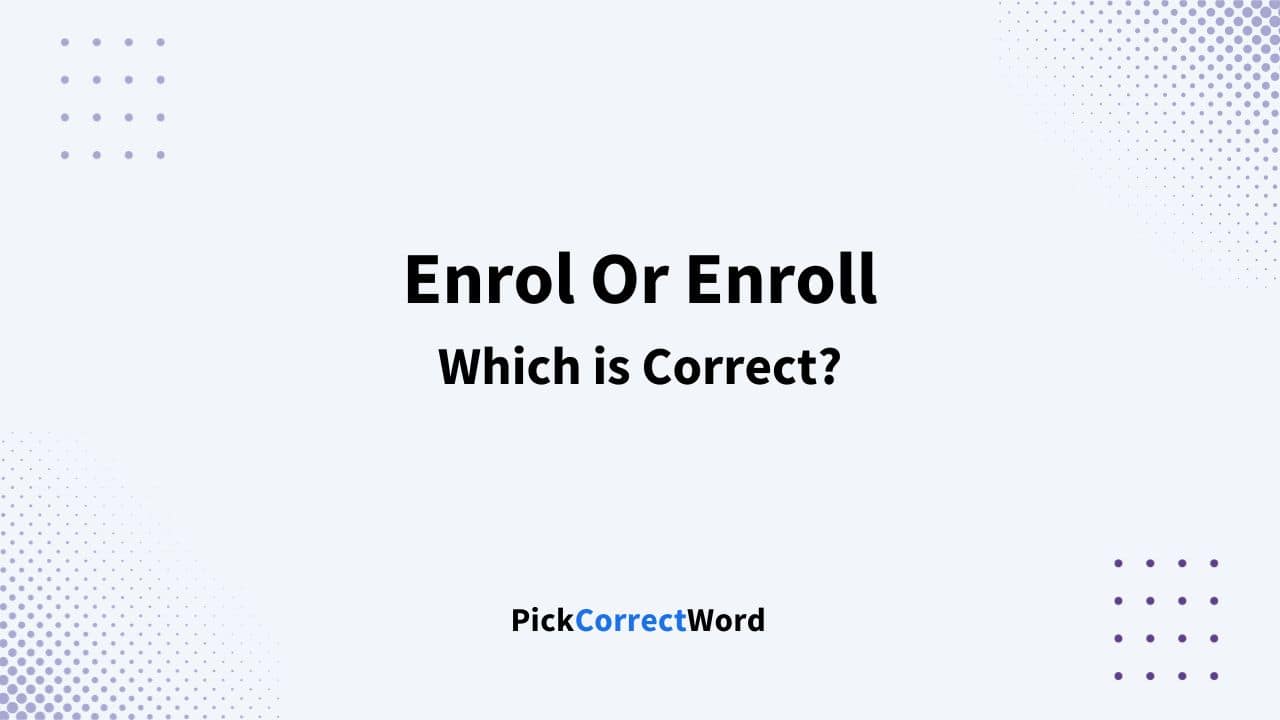Many words in American and British English are spelled differently, which can be confusing. Words like “enrol” and “enroll” are good examples of this.
“Enroll” is the correct word in American English. In British English, “enrol” with a single ‘l’ is the correct form.
Whatever style you choose—American or British—knowing the difference between the two can help you write more consistently and without mistakes.
Enrol or Enroll: Which is Correct?
To put it in simple words: Both ‘enrol’ and ‘enroll’ are correct.
The choice of spelling between “enrol” or “enroll,” depends on whether you are using British or American English.
British versus American English
- ‘Enrol’ is the correct spelling in British English
- ‘Enroll’ is the right spelling in American English
Meaning
According to Merriam-Webster, “enroll”/ɪnˈrəʊl/ is a verb that means “to insert, register, or enter someone in a list, catalog, or roll.” It can refer to the action of placing someone on an official list for an activity or group or accepting someone into such a list.
The spelling differences between “enrol” and “enroll” do not affect the meaning. It’s simply a matter of regional spelling practices. Let’s understand this further:
Enrol vs Enroll: Usage Examples
| British English | American English |
| You must enrol in the course by Friday to avoid late fees. | The university’s system allows students to enroll online. |
| After you enrol, check your email for a confirmation message. | It’s important to enroll early to secure a place in the class. |
| The school offers an automatic re-enrolment option. | Their enrollment numbers have increased this year. |
| She decided to enrol in the advanced pottery workshop. | You can enroll both in person and via the website. |
| Please complete your enrolment form accurately. | He was excited to enroll in the new fitness program. |
Examples of using Enrol in a sentence:
“I decided to enrol in a pottery class this summer to try something new.“
“You need to enrol your child in school before the academic year begins.“
“She was excited to enrol in the university’s study abroad program.“
“To enrol in the workshop, please fill out the registration form.“
“Many students enrol in online courses to learn at their own pace.“
“Before you can enrol, you must meet all the prerequisites.“
“The deadline to enrol for the health insurance plan is approaching.“
“People over 60 can enrol in the community center’s fitness program for free.“
“You must enrol in the library’s system to borrow books.“
“If you wish to enrol as a member of the club, please contact the secretary.“
Examples of using Enroll in a sentence:
“He decided to enroll in a cooking class to improve his culinary skills.“
“Parents need to enroll their children in summer camp before it fills up.“
“She’s going to enroll in a master’s program next fall.“
“To enroll in the loyalty program, please provide your email address.“
“Many professionals enroll in continuing education courses to keep up with industry trends.“
“Before you can enroll, you have to complete the online application.“
“The company encourages employees to enroll in their 401(k) retirement plan.“
“High school graduates often enroll in college for further education.“
“You need to enroll in the conference by submitting your details on the website.“
“To enroll for the marathon, visit the official event page and register.“
Frequently Asked Questions
Are “enrol” and “enroll” used to express the same action?
Yes, both terms refer to the act of officially registering for a course, program, or institution. The distinction in spelling doesn’t affect their meaning.
When should I use “enrol” versus “enroll”?
Your choice between “enrol” and “enroll” depends on the type of English you’re using. If you’re writing for an audience that follows American English conventions, use “enroll”. If your audience adheres to British English norms, use “enrol”.
Can I interchangeably use “enrol” and “enroll” in my writing?
While both words mean the same thing, it’s important to maintain consistency in your writing. Choose one spelling and stick to it throughout your document, based on your target audience’s preferred English variation.


